Update March 21st: we revisited the data, and noted that several committers identified as being independent or working for another company worked for one of Google or Red Hat. Cumulatively they accounted for over 4% of the commits. The statistics have been updated to reflect this. With these updated numbers the top 10 companies account for over 90% of all commits to the Kubernetes project, which is essentially no change since our analysis of last year.
Last week saw the announcement that Kubernetes had been accepted as the first hosted project by the Cloud Native Computing Foundation. This is a pretty significant milestone for the project, and for the Kubernetes community at large. The next steps in the process will involve Google transferring the underlying IP for Kubernetes to the Linux Foundatation.
It should be noted that there are still a number of areas that have to be clarified by the CNCF, such as what is defined as an incubated project v’s that which is in incubation, the process for being accepted, how IP transfer will occur and so forth. We do, however, expect all these pieces to be in place in the relatively short term.
The Kubernetes Community
When we looked at the overall code contributions to Kubernetes last August, the number of commits from Google and RedHat vastly outnumbered everyone else, and that is still the case.
The most interesting change since last August is the number of commits we have seen from Huawei, who have rapidly become the fifth largest code contributor, and fourth largest reporter of issues.
As with many projects heavy contributors to the project dominate the overall stats, with 84% of all commits coming from contributors who have made over 100 commits, and 95% of all commits coming from those with 10 or more commits. The top ten companies account for 86% of all code contributed, an improvement from the almost 90% mark we saw last August. Update March 21st: We revisited our data, and the top 10 companies account for 90.4% of all code contributed, a very slight increase since last August.
On the issues front we do so more diversity, and issues are a good proxy for people outside of the core contributors using the software, with the top ten companies accounting for 75% of all issues opened, down from almost 80%.
The Wider Community
I spoke at Kubecon EU last Friday, and discussed the wider world of contributions and advocacy. When we step out of the world of github we are seeing growth, and some significant growth, in other forums.
Growth on Stack Overflow
On Stack Overflow we are seeing a very strong growth in the number of questions over the last year, although it should be noted that the highest voted questions are all in the Kubernetes v’s some other technology rather than specific how do we resolve a problem type questions.
Global Meetups
Looking at meetups around the world we see a very strong growth curve, with eighty five meetups currently self identifying as being interested in Kubernetes. These are the locations where end-users are meeting and discussing the technology, and to my mind where much of the real grass roots advocacy for a new technology occurs.
Looking at the growth in these meetups over time, we see a distinct pick up in the latter half of 2016.
And their membership has overtaken the number of github stars for Kubernetes.
Onwards to Production?
What we have found interesting is some of the background conversations around Kubernetes deployments in the wild. As with all things containers, it is still relative early days for large scale production deployments, but they are a few happening, and we expect this to increase over the coming months, particularly with the more opinionated offerings such as RedHat OpenShift and CoreOS Tectonic. It has been especially interesting to hear about a number of large government organisations in several geographies that are rapidly moving towards production for some specific workloads.
Most of the deployments we have discussed, however, are proof of concept dev-test environments, focused around proving the value of container technologies and orchestration tools such as Kubernetes (and more importantly the value of CI) to business users. It is important to be clear here though, if an environment is exclusively for dev-test, it is not a production environment.
Disclaimer: RedHat, CoreOS, Meteor and Huawei are RedMonk clients.
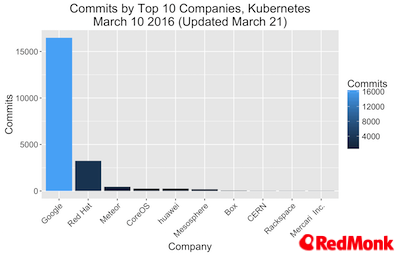
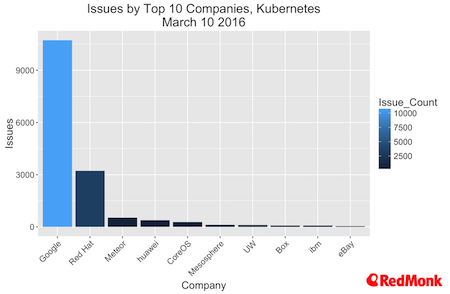
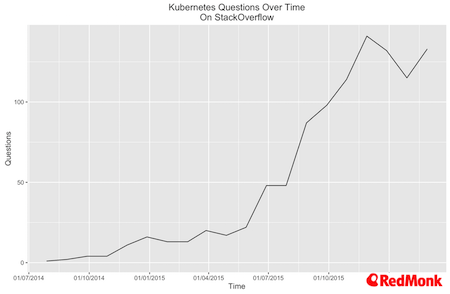
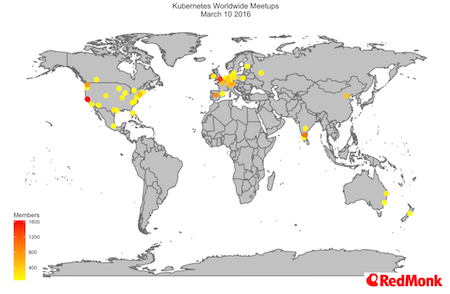
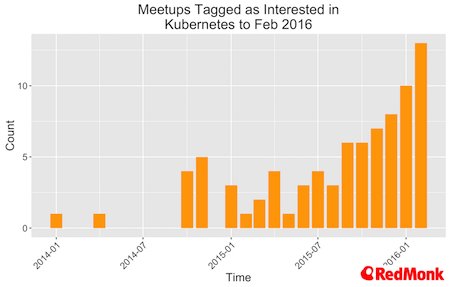
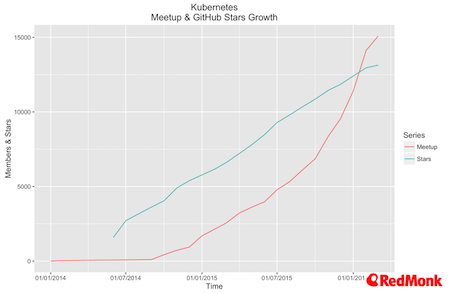
Beau Vrolyk says:
March 16, 2016 at 6:31 pm
For clarity, are the numbers in the first graphs for Commits and Issues for the Kubernetes project just the “core” of the project or does it include commits to the extended Kuberentes Community?
Top 10 links for the week of Mar 14 - HighOps says:
March 19, 2016 at 9:20 am
[…] The Further Evolution of Kubernetes […]
KubeWeekly #28 – KubeWeekly says:
March 25, 2016 at 9:46 am
[…] http://redmonk.com/fryan/2016/03/14/the-further-evolution-of-kubernetes/ […]
Top 10 links for the month of Mar + week of Mar 28 - HighOps says:
April 2, 2016 at 8:58 am
[…] The Further Evolution of Kubernetes […]